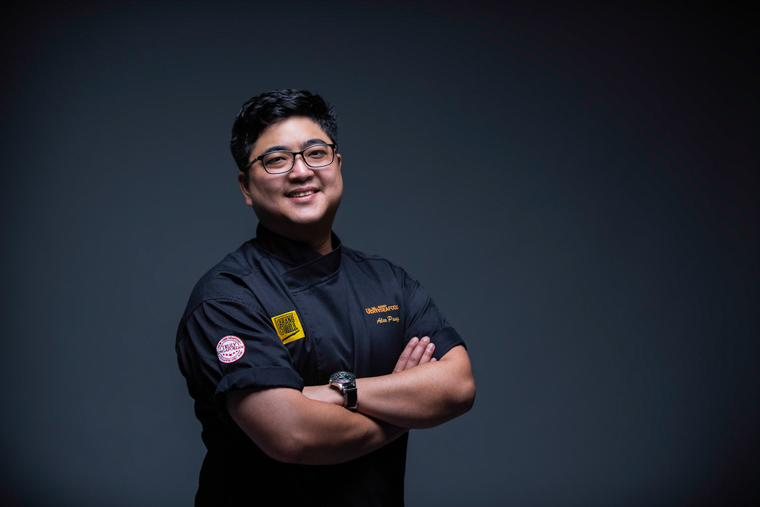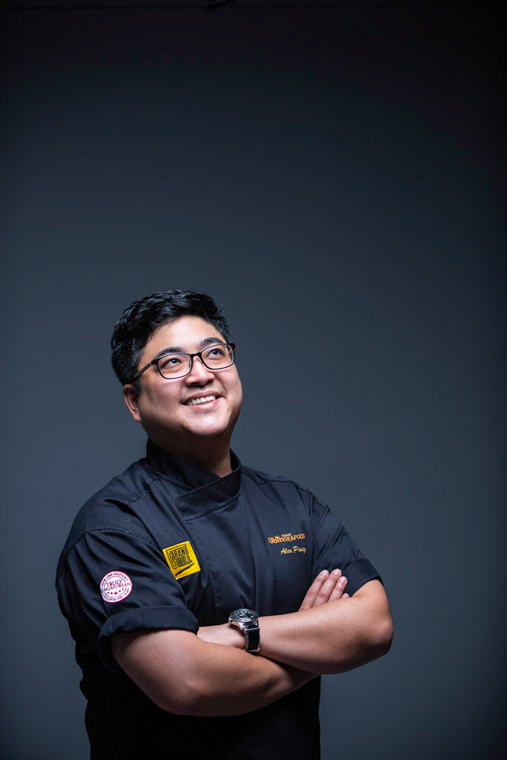According to Mr. Alexander Pang of New Ubin Seafood, the literal translation of tze char is "cook-fry", but colloquially, it is associated with casual Chinese dining involving food from a range of dialects, such as Cantonese and Hokkien. He adds, "The essence of tze char, at its core, is that it is a communal dining experience where family and close friends get together to eat shared dishes."
Today, Mr. Pang is the second-generation chef and CEO of New Ubin Seafood, one of Singapore's most celebrated tze char restaurants, known for its unique menu that puts Singaporean and Western dishes side by side. What diners get at every visit is the best of both worlds, as well as an elevated experience, thanks to its CHIJMES and Ramada Zhongshan Park locations. We recently caught up with the 34-year-old to find out what he has up his sleeve and how he intends to take the tze char culture to the next level.
Tell us about your earliest memory of tze char.
My earliest memories of tze char cuisine were borne from dining at Ban Leong Wah Hoe and the original Ka Soh, which are two relatively famous tze char eateries. Thinking of those dining experiences evokes a sense of nostalgia as eating out as a family was a treat. Tables were “cleaned” by a single wipe of a wet cloth, seats were simple plastic stools, while cutlery and tableware were melamine, yet, who cares as long as the food was awesome?
I would not be so bold as to claim that we do tze char well – only that we strive to do it the best we can. My hope is that decades from now, people will fondly remember dining at New Ubin Seafood (albeit in a more hygienic environment!).
From lawyer to full-time restaurateur – was this a career change you saw coming? What was the deciding factor that made you leave the boardroom for the kitchen and how has the transition been?
Cooking was always in my blood, from the time I mucked around in my grandmother’s kitchen to the time I began cooking meals for my family and friends. That said, I never thought that it would become a profession. I was dedicated to the practice and to this day, embrace it from an academic perspective. Leaving the practice and joining the family business were two separate decisions. I left legal practice shortly after making junior partner because I felt that although it gave me a sense of professional fulfillment, it also inhibited other aspects of my personal growth. In short, I had become defined by what I did rather than who I was.
Although I could have remained in the legal sector or taken up an in-house role, I chose to join the family business because I wanted to preserve and grow the legacy my father had built, and which we now continue to build together.
Your father was responsible for establishing the New Ubin brand and the flavors associated with it, while you're responsible for continuing the legacy. What have you done and what’s to come?
Both my father and I have different skillsets and yet, when it comes to certain things like fine-tuning the taste profile of a dish, we both have the same knack (and luck) of getting it right. While 2018 saw us open two new outlets – New Ubin Seafood CHIJMES and New Ubin Zhongshan Park – growth ought to be incremental.
I foresee Q1 and Q2 of 2019 as a time to reflect and consolidate the Group’s position. Meanwhile, Q3 and Q4 will be more exciting as we look to enter the online retail FMCG market and to expand on the services and experiences New Ubin Seafood is able to bring to Singapore. If the timing is right, we may plan to expand the group although we may do so under a separate brand.
Opening branches at CHIJMES and Ramada Zhongshan Park is a sign of change. What does New Ubin hope to achieve with these more upmarket branches?
To be direct, opening at CHIJMES and Ramada were opportunities that presented themselves and we undertook because of the value proposition of those opportunities. There was never any intention to move “upmarket” or “upscale”. In fact, part of the ethos of being “Truly Singaporean” is to remain accessible to everyone.
However, this doesn’t mean that we regret having these outlets that are considered upmarket because they appeal to a particular demographic like the corporate crowd and tourists. Ultimately, we want to ensure that we always maintain a presence in the heartlands of Singapore, and that is one of the concepts in the pipeline.
As CEO, how much of the decision making is yours and where does your father fit in in all this?
My father has entrusted the ultimate decision making power to me, although he also trusts that I exercise this judiciously and taking into consideration his counsel and the interests of our family and our stakeholders.
It is only natural that we disagree over certain business or operational decisions, but our primary goal is the same: To grow the business while ensuring that food standards are maintained (or better yet, improved), customers continue to be treated as guests in our own home, and that we remain true to our goal of being “Truly Singaporean”. For us, this means championing local cuisine, talent, and through the medium of food, sharing our experiences, culture, and identity with the world.
For future expansion, what are your considerations for location? Also, has the option of franchising been brought up?
My view is that even before we think about expansion, we ought to consider whether the brand has reached a saturation point. New Ubin Seafood prides itself on customer service and treating every person who walks through our doors as a regular. That kind of personalized “concierge” service is not something easily replicable.
We are presently able to maintain standards with three outlets, and would very carefully need to consider whether these standards can be maintained should we open another. For this reason, although we have been given multiple opportunities to franchise our brand, we are circumspect about doing so precisely because of the personalized service that we value. Our customers know our faces and those of our staff, and this is not something one is able to put into a corporate identity guide for replication.
What else do you have planned to take the tze char cuisine and industry to the next level? How do you see yourself putting your stamp on this Singaporean cultural asset?
One of our objectives is to help define what tze char and Singapore cuisine means. There are so very many possible interpretations, but ultimately we believe it boils down to what Singaporeans like to eat and yet, at the same time, maintaining flavor profiles, ingredients, and cooking methods that are unique to Singapore or were brought to Singapore by its immigrant population.
We do not view the preservation and development of tze char as an asset, but rather as a responsibility and a privilege. Our goal is to build a national brand for the purpose of reminding Singaporeans and the world that although we are a young nation, we have a rich cultural history that is identifiable in our food, service, and value systems.












 Back
Back
